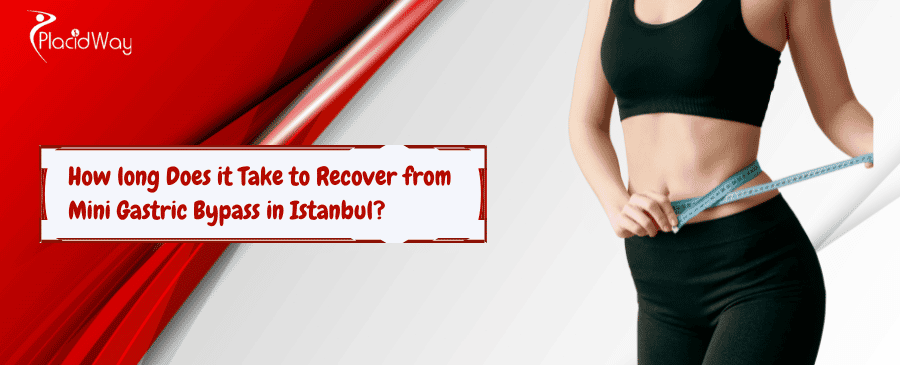Your Full Guide to Mini Gastric Bypass Recovery in Istanbul

Thinking about a mini gastric bypass in Istanbul? It's a significant step towards a healthier you, and one of the biggest questions people have is about the recovery time. Knowing what to expect can make the entire process feel more manageable. The good news is that a mini gastric bypass generally has a quicker recovery period compared to the traditional gastric bypass. This is because it's a less complex procedure. Right after the surgery, you'll spend a few days in the hospital under medical supervision. Once you're back home, your journey continues with a gradual return to your daily routine and a new way of eating.
The overall recovery is a phased process. The first couple of weeks are crucial for healing, and you'll be on a liquid and then a puréed diet. As you get stronger, you'll slowly reintroduce soft and then solid foods. While the initial healing is relatively fast, the complete adjustment, both physically and mentally, to your new lifestyle will take a few months. This guide will walk you through everything you need to know about the recovery process after a mini gastric bypass in Istanbul, from the moment you leave the operating room to embracing your new, healthier life.
Many people choose Istanbul for this procedure due to the high-quality medical care, experienced surgeons, and affordable costs. Understanding the recovery timeline, aftercare, and dietary changes will empower you to make an informed decision and prepare for a successful outcome. Let's explore the typical recovery journey and answer all the pressing questions you might have.
What is the typical hospital stay after a mini gastric bypass in Istanbul?
Your hospital stay is a critical part of your immediate recovery. During this time, the medical team will closely monitor your vital signs, manage any post-operative pain, and ensure you are not developing any immediate complications, such as leaks or infections. You'll be encouraged to start moving around, usually within a few hours of the surgery, to help prevent blood clots and promote healing. The nursing staff will also guide you on the initial stages of your new diet, which will consist of clear liquids.
Before you are discharged, your surgeon and a dietitian will provide you with detailed instructions for your at-home recovery. This will include information on your diet progression, wound care, and any prescribed medications, such as pain relievers and vitamin supplements. The goal of the hospital stay is to ensure you are stable and well-prepared to continue your recovery journey safely at home.
How soon can I return to work after the procedure?
The time you need to take off work largely depends on the nature of your job and your individual healing progress. If you have a sedentary or desk-based job, you might feel ready to return to work relatively quickly, sometimes as early as a week after your surgery, provided you are feeling well and your pain is well-managed. However, it's important to listen to your body and not rush the process. You may still experience fatigue as your body is using a significant amount of energy to heal.
For those whose jobs involve heavy lifting, strenuous physical activity, or a lot of movement, a longer recovery period is essential to prevent complications like hernias. In these cases, it's advisable to wait at least 4 to 6 weeks before returning to full duties. It's crucial to discuss your job requirements with your surgeon to get a personalized recommendation for when it is safe for you to go back to work.
When can I resume normal daily activities?
You'll be encouraged to start walking as soon as possible after your surgery to promote circulation and prevent blood clots. You can gradually increase the duration and intensity of your walks as you feel stronger. Most patients can manage light household chores and short walks within the first week. Driving is typically permitted after about 4 days, but only once you have stopped taking any prescription pain medications that could impair your judgment or reaction time.
It's important to avoid any activities that put a strain on your abdominal muscles for the first month to six weeks. This includes lifting anything heavier than a gallon of milk, pushing or pulling heavy objects, and intense exercise. Your surgeon will provide specific guidelines on when you can gradually reintroduce more strenuous activities into your routine. Following these instructions carefully is key to a smooth and complication-free recovery.
What does the dietary progression look like after a mini gastric bypass?
Your new stomach needs time to heal, so your diet will be carefully controlled and advanced in stages. This gradual progression helps to prevent complications and allows your digestive system to adapt to its new anatomy.
- Stage 1: Clear Liquids (First few days): This includes water, broth, unsweetened juice, and decaffeinated tea or coffee. The focus is on hydration.
- Stage 2: Full Liquids (First two weeks): You'll introduce thicker liquids like skim milk, sugar-free gelatin, and protein shakes.
- Stage 3: Puréed Foods (Weeks 2-4): At this stage, you can start having foods with a smooth, paste-like consistency, such as blended lean meats, cottage cheese, soft fruits, and cooked vegetables.
- Stage 4: Soft Foods (Weeks 4-8): You can now incorporate soft, easily chewable foods like scrambled eggs, flaked fish, and well-cooked vegetables.
- Stage 5: Solid Foods (After 8 weeks): With your doctor's approval, you can gradually return to eating solid foods, focusing on high-protein options and chewing everything thoroughly.
How soon can I fly back home after my mini gastric bypass in Istanbul?
While the hospital stay is short, your surgical team will want to see you for a post-operative check-up before you travel a long distance. This is to ensure your incisions are healing well and that there are no early signs of complications. The flight itself doesn't pose a direct risk, but the immobility during a long flight can increase the risk of blood clots. Your surgeon will likely advise you to get up and walk around the cabin periodically during the flight and may recommend wearing compression stockings.
It's also important to consider your comfort during the journey. You may still have some abdominal discomfort, and being in a cramped airplane seat for hours might be challenging. Planning for a slightly longer stay in Istanbul can make your return journey much more comfortable and safer. Always get clearance from your surgeon before booking your flight home.
What are the potential complications I should be aware of during recovery?
Every surgery has potential risks, and it's important to be informed. The clinics in Istanbul are known for their high standards, which helps to minimize these risks. However, you should be aware of the signs of potential complications so you can seek medical attention promptly if needed. These signs can include a fever, worsening abdominal pain, redness or discharge from your incisions, persistent nausea or vomiting, and shortness of breath.
In the long term, the main considerations are nutritional deficiencies. Because the mini gastric bypass alters the way your body absorbs nutrients, you will need to take vitamin and mineral supplements for life. These typically include a multivitamin, calcium, vitamin D, and iron. Regular follow-up appointments and blood tests are crucial to monitor your nutritional status and overall health.
What kind of aftercare support is provided by clinics in Istanbul?
The support you receive after your surgery is just as important as the procedure itself. Top clinics in Istanbul understand this and provide extensive aftercare services to ensure your long-term success. This typically starts with your post-operative check-up before you leave the city. Once you are back home, many clinics offer remote consultations via video calls to monitor your progress and answer any questions you may have.
You will also receive detailed dietary plans and guidance from nutritionists to help you adapt to your new eating habits. This support system is designed to help you navigate the challenges of recovery and achieve your weight loss goals in a healthy and sustainable way. When choosing a clinic, be sure to inquire about their aftercare program to ensure you will have the support you need throughout your journey.
How much pain should I expect during recovery?
The mini gastric bypass is usually performed laparoscopically, which means it involves several small incisions instead of one large one. This results in less pain and a quicker recovery compared to open surgery. While you are in the hospital, your pain will be managed with medication, often through an IV initially and then with oral pain relievers. You will be sent home with a prescription for pain medication to manage any discomfort during the first week or so of your recovery.
It's important to take your pain medication as prescribed to stay comfortable, as this will allow you to move around, which is crucial for your recovery. The soreness in your abdomen will lessen each day, and most people find that over-the-counter pain relievers are sufficient after the first week. If you experience severe or worsening pain, you should contact your surgeon immediately, as this could be a sign of a complication.
Will I have visible scars?
The laparoscopic technique used for a mini gastric bypass is minimally invasive. The surgeon will make a few small incisions, typically about half an inch long, to insert the surgical instruments and a tiny camera. This approach has many benefits, including reduced scarring. The incisions are closed with sutures or surgical glue and will heal over the next few weeks.
Initially, the scars will be red and slightly raised, but they will flatten and fade over the course of a year or two. To help minimize the appearance of your scars, it's important to follow your surgeon's wound care instructions carefully. This may include keeping the incisions clean and dry and avoiding sun exposure, which can darken the scars.
What is "dumping syndrome" and how can I avoid it?
Dumping syndrome can cause unpleasant symptoms like nausea, vomiting, dizziness, sweating, and diarrhea. It's not a dangerous condition, but it can be very uncomfortable. The best way to prevent dumping syndrome is to be mindful of what and how you eat. This means avoiding sugary drinks and foods, as well as high-fat and fried foods.
It's also important to eat small meals, chew your food thoroughly, and eat slowly. Drinking liquids with your meals can also trigger dumping syndrome, so it's recommended to wait at least 30 minutes after a meal before drinking anything. By adhering to the dietary advice provided by your medical team in Istanbul, you can effectively manage and often completely avoid dumping syndrome.
Do I need to take vitamins and supplements for life?
The mini gastric bypass works by both restricting the amount of food you can eat and reducing the absorption of calories and nutrients. This malabsorptive component makes it necessary to take supplements to ensure your body gets all the essential vitamins and minerals it needs to function properly. Without supplementation, you could be at risk for serious health problems, including anemia, osteoporosis, and neurological issues.
Your surgeon and dietitian will provide you with a specific supplement regimen, which will likely include:
- A high-potency multivitamin
- Calcium with vitamin D
- Iron
- Vitamin B12
How much weight can I expect to lose?
The amount of weight you lose will depend on several factors, including your starting weight and your adherence to the post-operative lifestyle changes. The weight loss is usually most rapid in the first few months after surgery. It's important to remember that the mini gastric bypass is a tool to help you lose weight, but it's not a magic bullet. Your long-term success will depend on your commitment to a healthy diet and regular exercise.
By following the guidance of your medical team, you can achieve significant and lasting weight loss, which can lead to the resolution or improvement of many obesity-related health conditions, such as type 2 diabetes, high blood pressure, and sleep apnea. The dramatic weight loss can also lead to a significant improvement in your quality of life, mobility, and self-esteem.
Is it possible to regain weight after a mini gastric bypass?
Weight regain can happen if you fall back into old habits, such as consuming high-calorie, sugary, or fatty foods, or if you don't engage in regular physical activity. The small stomach pouch created during the surgery can also stretch over time if you consistently overeat, which will allow you to consume larger portions.
To maintain your weight loss, it's crucial to view the mini gastric bypass as the start of a new, healthier lifestyle. This means making permanent changes to your eating habits, focusing on nutritious foods, and making exercise a regular part of your routine. The ongoing support from your clinic in Istanbul can be invaluable in helping you stay on track and maintain your hard-earned results.
What kind of exercise is recommended during recovery?
Exercise is a vital component of your recovery and long-term success. In the first few weeks, the focus will be on gentle movement. Walking is an excellent low-impact exercise that you can start almost immediately. It helps to improve circulation, prevent complications, and build your stamina. You can start with short, frequent walks and gradually increase the distance and pace as you feel more comfortable.
After about a month to six weeks, once you have been cleared by your surgeon, you can start to incorporate more varied and intense forms of exercise. This can include activities like swimming, cycling, and light strength training. It's important to start slowly and listen to your body, gradually increasing the intensity and duration of your workouts. Regular physical activity will not only help you lose weight but also improve your overall health, mood, and energy levels.
Will my mental health be affected during recovery?
Weight loss surgery is a major life change, and it's normal to experience a range of emotions during your recovery. You might feel excited and optimistic about your new life, but you may also feel overwhelmed by the dietary changes and the physical recovery process. Some people experience mood swings or feel a sense of loss for their old relationship with food.
It's important to have a strong support system in place, whether it's from family, friends, or a support group for bariatric surgery patients. Many clinics in Istanbul offer psychological support as part of their aftercare programs. Talking to a therapist or counselor who has experience with weight loss surgery patients can also be very helpful. Taking care of your mental health is just as important as your physical health during this transformative journey.
Ready to take the next step in your weight loss journey?Explore PlacidWay to find trusted clinics and experienced surgeons for your mini gastric bypass in Istanbul. We are here to help you connect with world-class healthcare providers and make your dream of a healthier life a reality.


.png)






.png)
.png)






Share this listing